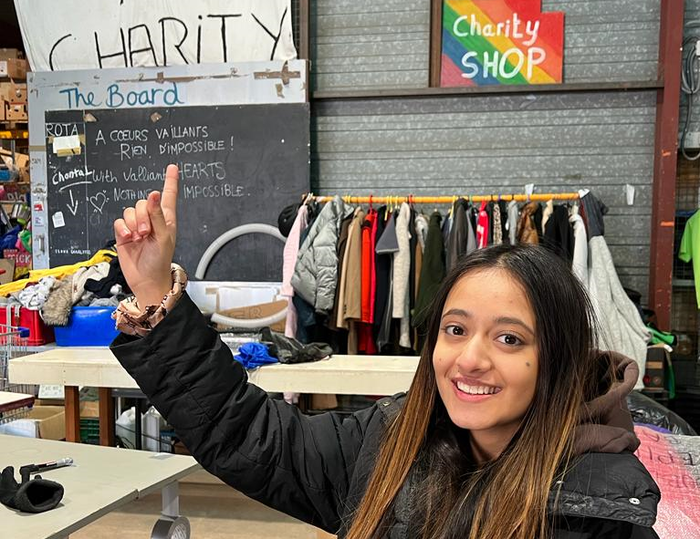Founding a new society and pursuing peace: an interview with CURAP
Lois Kildea speaks to Sienna James about her experience founding a new society and the need for peacebuilding across political divides

“If the society you want to join doesn’t yet exist, you can set it up” is a university open day cliché. But do many of us actually pay heed to this advice, and how does one go about establishing a new society ex nihilo? These are the questions I posed via Zoom to Sienna James, an Art Historian who, last summer, founded Cambridge University Research Association for Peace — “the university’s first student-led issue-specific think tank”.
The natural starting point for our conversation is why Sienna chose to set up a new society dedicated to peacebuilding. She explains that the idea to start CURAP arose following a shift in her career aspirations: “motivated not by a job but by a cause.” During Michaelmas of her second year, Sienna attended an event hosted by the Rose Castle Foundation, a charitable organisation specialising in peacebuilding between Abrahamic faiths, where she watched a documentary about women from Muslim and Jewish communities in America coming together to “speak about their differences.” Sienna remembers leaving and feeling “like there’s something that I should be doing here.”
“In Cambridge, there’s a lot of politics societies, but there’s not much around peace”
Back in Cambridge, Sienna began to search for an extracurricular activity through which she could pursue and develop her newfound interest in peacebuilding. When she realised that no such society existed, Sienna decided to set one up. She explains: “in Cambridge, there’s a lot of politics societies, whether that’s party politics, environmental, or cause-specific, but there’s not much around peace, and if there is, it’s more about […] international relations” than the peacebuilding within countries that interests Sienna.
After designing and launching a website, Sienna attempted to recruit other students who shared her interest in peacebuilding. Considering that she had already begun to invest her time and energy into CURAP, I asked Sienna whether, at this stage, she was anxious about sign-ups. Her response was insightful yet pragmatic: “I suppose I thought, well, if no one applies, …. this isn’t needed.” However, sign-ups were quick to come in, confirming that Sienna was not alone in perceiving a cultural need for better dialogue across political divides.
As CURAP gathered researchers, ideas began to flow, and Sienna’s vision started to solidify into a collective project. Sienna laughs as she explains that previously she was involved in “artsy stuff” which was “mildly vague” and lacking “a determined output”. Therefore, one of her aims in launching CURAP was to produce something tangible, like “a paper within a year” and in Michaelmas 2022, this is what the recently formed committee of seventeen or so students, from an array of disciplines and at different academic stages, set out to do.
This year, CURAP chose to examine the nature of political discourse in UK universities by investigating how and why political labels are used as insults and compliments, and loaded with normative content, more often than they are used as purely descriptive categories. Some may query whether political labelling is a relevant topic for a society devoted to peacebuilding to research, but I sense that those involved in CURAP believe that peacebuilding partly consists of less polarised, more peaceful exchanges between those who disagree politically. Indeed, Sienna explains that the research topic arose quite naturally from committee members’ personal experiences of either using labels in a derogatory manner, or having a label applied to them.
As publication day approaches, I ask Sienna about her experience of leading a team. She recalls feeling nervous before the first focus group and wondering “who’s going to turn up” on a rainy November evening in the middle of term. As it happened, those who signed up turned up, and the conversation ran on beyond the scheduled finish time, covering topics like Camfess and the use of social media. People seemed to “really care … they weren’t just hanging around but wanted to be there and express their views.” For Sienna and other committee members who were present, it was satisfying to watch participants’ confidence increase and recognise that their contributions were valuable.
Sienna considers one of CURAP’s most interesting findings to be the phenomenon of students “atoning” for “wealth and privilege” and other aspects of their background. She describes it as “absolutely fascinating” and adds: “I wasn’t expecting it at all, but it came up as a recurring theme.” Another memorable moment was when one participant began to outline a ‘fake feminist’ figure, recognised instantly by her fellow participants, which Sienna thought “was kind of hilarious, but [...] worryingly [so].”
Given Sienna is soon to graduate, we close by considering CURAP’s future. Her hope is that one of the second years on committee will succeed her as President, and that new members will join. If not, however, Sienna is unfazed, telling me “I’m also happy with it being a one-year project [because] I think the right amount of people have been involved to make it worthwhile.”
 News / Cambridge students set up encampment calling for Israel divestment6 May 2024
News / Cambridge students set up encampment calling for Israel divestment6 May 2024 News / Cambridge postgrad re-elected as City councillor4 May 2024
News / Cambridge postgrad re-elected as City councillor4 May 2024 News / Proposed changes to Cambridge exam resits remain stricter than most7 May 2024
News / Proposed changes to Cambridge exam resits remain stricter than most7 May 2024 News / Some supervisors’ effective pay rate £3 below living wage, new report finds5 May 2024
News / Some supervisors’ effective pay rate £3 below living wage, new report finds5 May 2024 Fashion / Class and closeted identities: how do fits fit into our cultures?6 May 2024
Fashion / Class and closeted identities: how do fits fit into our cultures?6 May 2024






